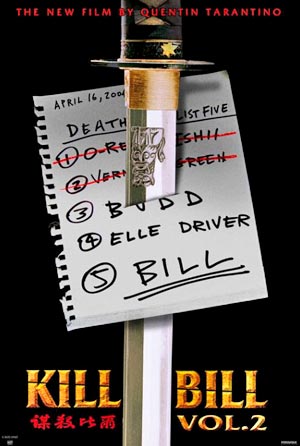 That Kill Bill Vol. 2 is volumes better than Vol. 1 is beyond question. But why it is makes for such a better picture a more puzzling proposition. Certainly Quentin Tarantino has crammed a film course’s worth of references into the action (there’s even an irritating “homework” aspect to it; if you don’t wait around for the closing credits, for example, you won’t notice that one of the characters is christened a double-D Budd, and so hence is a reference to director Budd Boetticher). And there are moments in nearly every sequence when you begin to pay more attention to that itchy butt rather than to onscreen action hanging on past its prime.
That Kill Bill Vol. 2 is volumes better than Vol. 1 is beyond question. But why it is makes for such a better picture a more puzzling proposition. Certainly Quentin Tarantino has crammed a film course’s worth of references into the action (there’s even an irritating “homework” aspect to it; if you don’t wait around for the closing credits, for example, you won’t notice that one of the characters is christened a double-D Budd, and so hence is a reference to director Budd Boetticher). And there are moments in nearly every sequence when you begin to pay more attention to that itchy butt rather than to onscreen action hanging on past its prime.
No question, though, about this film’s emotional superiority, its overall alacrity, and a ferocity that is, finally, as visceral as it is calculated. Whereas the first outing’s sea of blood and walls of pain tended to dissipate in gaudy show, the somewhat reduced level of violence in Vol. 2 benefits from a much keener appreciation of human consequence.
For this, we may have David Carradine’s face to thank or, to put it more precisely, Tarantino’s connoisseur’s appreciation for it. Carradine, the last of the white ’70s exploitation stars still standing, has the lined, wrinkled face of a veteran. Yet, those are simply an overlay on top of a hard-to-fake, open-eyed and guilelessly-voiced ingenuousness. The contrast lends Carradine’s characterization of Kill Bill’s eponymous villain a competing vulnerability to vie with his cynicism.
So while Tarantino’s camerawork is often given over to dramatically memorable bravura, it may be his attentive, oblique close-ups of Carradine’s face which ultimately gives the film its needed oomph.
That intimacy is foreshadowed in the movie’s violence, which assumes an intimacy it lacked in last fall’s episode. Starting off which the Bride (Uma Thurman) narrating an intro from behind the wheel of a sports car, the movie proceeds to a flashback which once again depicts the mass murder at the Bride’s wedding rehearsal at an isolated Texas wedding chapel. This time, though, Tarantino jumps a bit further back in time, to the minutes before the Bride’s former comrades in the Five Viper assassination team (Michael Madsen, Daryl Hannah, Lucy Liu and Vivica A. Fox) enter the ramshackle building and kill everyone (everyone but the Bride, that is).
Tarantino decides to follow an old narrative recipe, and show us the heavy at the beginning of the action. While she’s taking a cigarette break, the Bride (we get to hear her full name, by the way, but only at the end), encounters Bill, who has tracked her down despite a false name and many months absence from the team. The back-and-forth, laconic if not terse, is wonderfully written and shot (by ace Robert Richardson) in bleached-out black-and-white. Tarantino is successfully laying down an emotional track that will accompany the ensuing violence, the emotion informing the violence just as the violence will continually and cleverly subvert the expected emotions.
The filmmaker does mar the sequence somewhat with a wholly irrelevant homage to the opening shot of John Ford’s The Searchers, but it is not a shape of things to come. Yes, there are references abounding, but there less frantic and mainly more general. In brief, Tarantino takes on Westerns and Spaghetti Westerns in a long vignette in which the Bride goes after Budd, who is holed up in a trailer in the California desert.
This part of the movie reveals Tarantino’s talent for tangents, as we get a taste of the killer’s reduced circumstances, not just at home, but at work at a cheap strip joint, where he’s a disrespected bouncer. Tarantino also ties in other strands of the plot, letting both Bill and Daryl Hannah’s one-eyed Elle Driver slice of bits of the action for herself.
After that comes a broadly humorous tribute to kung fu movies featuring Hong Kong star Gordon Liu, who appeared as one of the black-suited Crazy 88s in Vol. 1 and who, to get to his real career, who starred in two of the best-ever period kung fu movies, Dirty Ho and The 36th Chamber of Shaolin. Compared to the martial arts references in Vol. 1, this episode feels more relaxed. That provides dramatic space for the characters and, perforce, emotion.
Not everything is a tribute, of course, and Tarantino has plenty new – OK, newish – to offer in terms of dialogue and action, particularly violent, life-ending action.
Yet, the apparently paradoxical combination of more casual film references and increased anxiety on the part of the characters make for a more pleasurable, and intense, movie. It is, to strain at a metaphor, as if Vol. 1 and Vol. 2 has been built at the same shipyard, but had set out on different voyages, one leading to a rocky foundering and the other to palmy climes.
